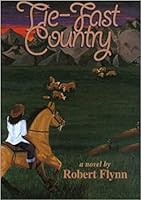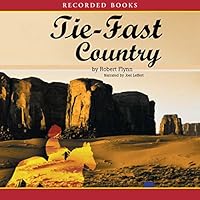- Welcome to FictionDB, Guest
- | My Account
- | Help

Tie-Fast Country — Robert Flynn
buy the book from amazon
Paperback editions:
Hardcover editions:
eBook editions:
Audio editions:
Large Print editions:
Browse Similar Books at Amazon
Literature & Fiction->Literary
Literature & Fiction->Genre Fiction->Psychological
Audible Books & Originals->Categories->Literature & Fiction->Genre Fiction->Literary Fiction
Audible Books & Originals->Categories->Literature & Fiction->Genre Fiction->Psychological
Description
The tangled relationships of Robert Flynn's award- winning novel Wanderer Springs surface again in Tie- Fast Country, this time centered around an elderly ranch woman, whose father raised her to be a cowboy, and her grandson, who doesn't know her and has been raised to hate her.
When Chance Carter, general manager of a TV station in Florida, gets a telephone call that his grandmother's health is failing and that he must do something about her, he knows only that he is heir to a million-dollar ranch and that his grandmother may have killed his grandfather and the man who was perhaps his father. His idea of a Texas ranch comes from television and he does not know what he will have to do to slide Rista Wyler off her land and into a nursing home. Nor does he know that the only cowboy Rista has left is Pug Caldwell, an old man who has worked for her since he was a teenager and may want the ranch for himself.
Reluctantly Chance leaves Florida behind, where he is in control of his own world, and also leaves Shana, the woman he loves but to whom he cannot quite commit. He finds himself more than a world away on the Texas ranch where Rista and Pug have thrown up barricades against intruders. He has no television, no phone, no contact with the outside world. And the food is monotonous and not very good.
As Chance watches for certifiable signs of senility in Rista and plans what he'll say to a judge, she puts him to work mending fences and doctoring cows with Pug. In chapters that alternate between the past and the present, Rista reveals the truth of the tangled story of her life. Gradually she introduces Chance to people and events that his mother had dis- torted in the telling. He finds out why Rista still searches the ranch for the undiscovered grave of her aunt, killed by Indians; he comes to know his grandfather, Odis, and even his great-grandfather, Claris, men of different temperaments and different loyalties. And he learns about Stoddard, the newspaperman Rista loved but could not marry. He even learns some bitter truths about his mother, Cassie, and her hatred for the ranch.
Chance comes to understand that Rista's commitment to the land is the strongest force in her life, a commitment taught her by her father. Over the years her tenacity in hanging on to the land cost her husband, lover, daughter, and grandson, but she never considered changing.
As Chance is learning to understand, if not accept completely, the world of his grandmother, Shana provides the sharp contrast of modern life. When Chance escapes to a telephone in town and calls Shana, she reports on the TV station, where sensationalism, not truth, matters.
With a strong and sure narrative voice, Flynn tells a dramatic story about people, the inability of some to change, the ability of others to adapt, and the lessons some learned. The novel is set against a ranching back- ground that is accurate down to the last detail and word.
When Chance Carter, general manager of a TV station in Florida, gets a telephone call that his grandmother's health is failing and that he must do something about her, he knows only that he is heir to a million-dollar ranch and that his grandmother may have killed his grandfather and the man who was perhaps his father. His idea of a Texas ranch comes from television and he does not know what he will have to do to slide Rista Wyler off her land and into a nursing home. Nor does he know that the only cowboy Rista has left is Pug Caldwell, an old man who has worked for her since he was a teenager and may want the ranch for himself.
Reluctantly Chance leaves Florida behind, where he is in control of his own world, and also leaves Shana, the woman he loves but to whom he cannot quite commit. He finds himself more than a world away on the Texas ranch where Rista and Pug have thrown up barricades against intruders. He has no television, no phone, no contact with the outside world. And the food is monotonous and not very good.
As Chance watches for certifiable signs of senility in Rista and plans what he'll say to a judge, she puts him to work mending fences and doctoring cows with Pug. In chapters that alternate between the past and the present, Rista reveals the truth of the tangled story of her life. Gradually she introduces Chance to people and events that his mother had dis- torted in the telling. He finds out why Rista still searches the ranch for the undiscovered grave of her aunt, killed by Indians; he comes to know his grandfather, Odis, and even his great-grandfather, Claris, men of different temperaments and different loyalties. And he learns about Stoddard, the newspaperman Rista loved but could not marry. He even learns some bitter truths about his mother, Cassie, and her hatred for the ranch.
Chance comes to understand that Rista's commitment to the land is the strongest force in her life, a commitment taught her by her father. Over the years her tenacity in hanging on to the land cost her husband, lover, daughter, and grandson, but she never considered changing.
As Chance is learning to understand, if not accept completely, the world of his grandmother, Shana provides the sharp contrast of modern life. When Chance escapes to a telephone in town and calls Shana, she reports on the TV station, where sensationalism, not truth, matters.
With a strong and sure narrative voice, Flynn tells a dramatic story about people, the inability of some to change, the ability of others to adapt, and the lessons some learned. The novel is set against a ranching back- ground that is accurate down to the last detail and word.
CERTAIN CONTENT THAT APPEARS ON THIS PAGE COMES FROM AMAZON. THIS CONTENT IS PROVIDED ‘AS IS’ AND IS SUBJECT TO CHANGE OR REMOVAL AT ANY TIME.


 Amazon UK
Amazon UK